special skils to suck their cocks and lick their chow hais?They always said : Sinkees lack the special skills.
KNNCCB to them.
-
IP addresses are NOT logged in this forum so there's no point asking. Please note that this forum is full of homophobes, racists, lunatics, schizophrenics & absolute nut jobs with a smattering of geniuses, Chinese chauvinists, Moderate Muslims and last but not least a couple of "know-it-alls" constantly sprouting their dubious wisdom. If you believe that content generated by unsavory characters might cause you offense PLEASE LEAVE NOW! Sammyboy Admin and Staff are not responsible for your hurt feelings should you choose to read any of the content here. The OTHER forum is HERE so please stop asking.
You are using an out of date browser. It may not display this or other websites correctly.
You should upgrade or use an alternative browser.
You should upgrade or use an alternative browser.
Cheating with fake degrees is so rampant: more than 2 cases a day!
- Thread starter LITTLEREDDOT
- Start date
Is this the reason why the MOM Minister hesitates to conduct the authenticity verification of all CECA indians?special skils to suck their cocks and lick their chow hais?
Last edited:
MOM not sleeping. They just close their eyes...MOM sleeping for many years.


Think better close down NUS and NTU...No locals work can teach in university? Why hire foreigners?

So the Ministry of Manpower has not been verifying the education qualifications of EP holders all along!!??
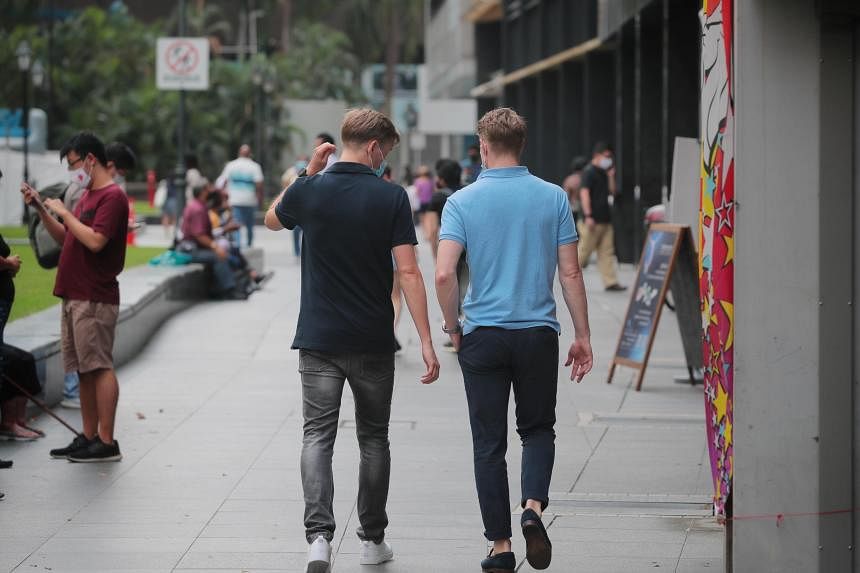
The move coincides with the launch of a new points-based framework for new Employment Pass applications. PHOTO: ST FILE

Tay Hong Yi
Mar 1, 2023
SINGAPORE – To ensure that Employment Pass (EP) applicants are not granted work passes based on fake qualifications, employers will need to provide third-party verification of their diploma and higher qualifications from Sept 1, 2023.
The move coincides with the Sept 1 launch of a new points-based framework for new EP applications called Complementarity Assessment (Compass).
This is because an EP applicant’s qualifications will contribute to his Compass score, which will determine whether he is awarded the work pass, said Minister for Manpower Tan See Leng during the debate for the Ministry of Manpower’s (MOM) budget on Wednesday.
Under Compass, an EP application is scored based on four “foundational criteria” and two “bonus criteria”, covering both an applicant’s and his employer’s attributes. The worker’s qualifications are one of the foundational criteria.
The Government, which has consulted industry associations, employers and the labour movement about the verification process, will share more details in due course, said Dr Tan, who is also Second Minister for Trade and Industry. For EP renewals, Compass and the verifying of qualifications will apply from 2024.
“Rest assured that we will ensure smooth implementation and minimise disruptions to employers’ hiring process,” the minister said.
The move is poised to add another safeguard against fake qualifications, even though employers are already responsible for ensuring the authenticity of an applicant’s credentials, and MOM conducts its own checks. But employers that do not wish to rely on applicants’ qualifications to add points under Compass do not have to submit the verification.
Dr Tan did not elaborate on whether the added verification could affect the time it takes to process EP applications. Online applications currently take 10 business days.
He added that further details on Compass’ bonus criteria, which pertain to skills held by the applicant that are in shortage in Singapore, and the employer’s contribution to the Republic’s strategic economic goals, will be revealed later in March.
The bonus points will cover a targeted minority of strategic EP applications, as the Government expects most applications to obtain a passing score on Compass on the basis of the foundational requirements.
He also announced on Wednesday that employers in services and manufacturing can hire only up to 8 per cent of their total workforce under the Non-traditional Source (NTS) Occupation List, and have to pay these work permit holders at least $2,000 a month.
The occupation list, which was revealed in 2022 but kicks in from Sept 1, stipulates seven rank-and-file roles, such as those of cooks in Indian restaurants, for which employers can hire work permit holders – instead of S Pass holders – from Bangladesh, India, Myanmar, the Philippines, Sri Lanka and Thailand. Typically, employers in the service and manufacturing sectors can hire work permit holders only from China, Malaysia, Hong Kong, Macau, South Korea and Taiwan.
Dr Tan said the quota guards against over-reliance on workers from NTS countries and regions, and ensures that employers diversify their workforce. The minimum salary safeguards against sourcing just the cheapest talent and encourages employers to hire higher-skilled or more experienced workers, he added.
Dr Tan on Wednesday also announced CareersFinder, a new feature on the MyCareersFuture online portal that recommends local residents jobs based on their expressed interests, the skills required and the training pathways available.
The artificial intelligence-driven tool will cut out the hassle of figuring what skills one needs for a job posting, and then the separate hunt for training courses.
A beta version is set for launch in the third quarter of 2023, and registration of interest can be made via the Workforce Singapore website.
“It will become more powerful as the data grows. We will continue to enhance it over time, to make it more responsive to job seekers’ needs,” said Dr Tan.
As borders reopen after the pandemic and foreign investments flow in, local workers are increasingly coming under heat to both compete with international talent and step up to jobs brought in by multinational enterprises.
Dr Tan urged workers to take charge of their own “career health” by tracking their own job marketability, charting their own development, and being resilient against setbacks.
In return, the ministry will support them “every step of the way”, he said.
Continuing the ministry’s years of work to raise working conditions for female workers, elderly workers, workers with disabilities and former offenders, Dr Tan briefed the House on various schemes and their results in securing fair opportunities for these groups.
These include flexible work arrangement guidelines; wage subsidies for employers that hire the elderly, former offenders and workers with disabilities; and progress towards a workplace fairness Bill.
Another group that has drawn the Government’s attention are skilled essential trade workers such as plumbers and electricians.
“Our society has traditionally valued ‘head’ work much more over ‘hands-on’ and ‘heart’ work, contributing to occupational wage disparity. But ‘hands-on’ work – the craft required to make something well, to fix a complex machine – is just as important for our society to function,” he said.
MOM and the National Trades Union Congress are studying ways to make these jobs pay better and offer clearer career and skill progression, with more details to come after the Forward Singapore consultation exercise concludes later in 2023.
This comes after the labour movement mooted in February a new framework to create clear career ladders for essential skilled tradesmen, dubbed the Career Progression Model.
Said Dr Tan: “Over time, if we are able to shift the prospects and perceptions of such jobs and offer attractive career pathways for skilled trades, we will be able to increase the number of locals in these roles in a sustainable way.”
Employers must verify education qualifications of EP applicants from Sept 1

The move coincides with the launch of a new points-based framework for new Employment Pass applications. PHOTO: ST FILE

Tay Hong Yi
Mar 1, 2023
SINGAPORE – To ensure that Employment Pass (EP) applicants are not granted work passes based on fake qualifications, employers will need to provide third-party verification of their diploma and higher qualifications from Sept 1, 2023.
The move coincides with the Sept 1 launch of a new points-based framework for new EP applications called Complementarity Assessment (Compass).
This is because an EP applicant’s qualifications will contribute to his Compass score, which will determine whether he is awarded the work pass, said Minister for Manpower Tan See Leng during the debate for the Ministry of Manpower’s (MOM) budget on Wednesday.
Under Compass, an EP application is scored based on four “foundational criteria” and two “bonus criteria”, covering both an applicant’s and his employer’s attributes. The worker’s qualifications are one of the foundational criteria.
The Government, which has consulted industry associations, employers and the labour movement about the verification process, will share more details in due course, said Dr Tan, who is also Second Minister for Trade and Industry. For EP renewals, Compass and the verifying of qualifications will apply from 2024.
“Rest assured that we will ensure smooth implementation and minimise disruptions to employers’ hiring process,” the minister said.
The move is poised to add another safeguard against fake qualifications, even though employers are already responsible for ensuring the authenticity of an applicant’s credentials, and MOM conducts its own checks. But employers that do not wish to rely on applicants’ qualifications to add points under Compass do not have to submit the verification.
Dr Tan did not elaborate on whether the added verification could affect the time it takes to process EP applications. Online applications currently take 10 business days.
He added that further details on Compass’ bonus criteria, which pertain to skills held by the applicant that are in shortage in Singapore, and the employer’s contribution to the Republic’s strategic economic goals, will be revealed later in March.
The bonus points will cover a targeted minority of strategic EP applications, as the Government expects most applications to obtain a passing score on Compass on the basis of the foundational requirements.
He also announced on Wednesday that employers in services and manufacturing can hire only up to 8 per cent of their total workforce under the Non-traditional Source (NTS) Occupation List, and have to pay these work permit holders at least $2,000 a month.
The occupation list, which was revealed in 2022 but kicks in from Sept 1, stipulates seven rank-and-file roles, such as those of cooks in Indian restaurants, for which employers can hire work permit holders – instead of S Pass holders – from Bangladesh, India, Myanmar, the Philippines, Sri Lanka and Thailand. Typically, employers in the service and manufacturing sectors can hire work permit holders only from China, Malaysia, Hong Kong, Macau, South Korea and Taiwan.
Dr Tan said the quota guards against over-reliance on workers from NTS countries and regions, and ensures that employers diversify their workforce. The minimum salary safeguards against sourcing just the cheapest talent and encourages employers to hire higher-skilled or more experienced workers, he added.
Dr Tan on Wednesday also announced CareersFinder, a new feature on the MyCareersFuture online portal that recommends local residents jobs based on their expressed interests, the skills required and the training pathways available.
The artificial intelligence-driven tool will cut out the hassle of figuring what skills one needs for a job posting, and then the separate hunt for training courses.
A beta version is set for launch in the third quarter of 2023, and registration of interest can be made via the Workforce Singapore website.
“It will become more powerful as the data grows. We will continue to enhance it over time, to make it more responsive to job seekers’ needs,” said Dr Tan.
As borders reopen after the pandemic and foreign investments flow in, local workers are increasingly coming under heat to both compete with international talent and step up to jobs brought in by multinational enterprises.
Dr Tan urged workers to take charge of their own “career health” by tracking their own job marketability, charting their own development, and being resilient against setbacks.
In return, the ministry will support them “every step of the way”, he said.
Continuing the ministry’s years of work to raise working conditions for female workers, elderly workers, workers with disabilities and former offenders, Dr Tan briefed the House on various schemes and their results in securing fair opportunities for these groups.
These include flexible work arrangement guidelines; wage subsidies for employers that hire the elderly, former offenders and workers with disabilities; and progress towards a workplace fairness Bill.
Another group that has drawn the Government’s attention are skilled essential trade workers such as plumbers and electricians.
“Our society has traditionally valued ‘head’ work much more over ‘hands-on’ and ‘heart’ work, contributing to occupational wage disparity. But ‘hands-on’ work – the craft required to make something well, to fix a complex machine – is just as important for our society to function,” he said.
MOM and the National Trades Union Congress are studying ways to make these jobs pay better and offer clearer career and skill progression, with more details to come after the Forward Singapore consultation exercise concludes later in 2023.
This comes after the labour movement mooted in February a new framework to create clear career ladders for essential skilled tradesmen, dubbed the Career Progression Model.
Said Dr Tan: “Over time, if we are able to shift the prospects and perceptions of such jobs and offer attractive career pathways for skilled trades, we will be able to increase the number of locals in these roles in a sustainable way.”
Ranking of frauds
1. CECA
2. Tiong
3. VIETCONG
4. PINA
1. CECA
2. Tiong
3. VIETCONG
4. PINA
many atbs who are married to sinkie unkers are getting fake mbas from fly by night tiong “universities” in sg chinatown to improve their chances of getting their pr applications approved.
NTU don accused of plagiarising former student’s work ‘no longer employed by the university’
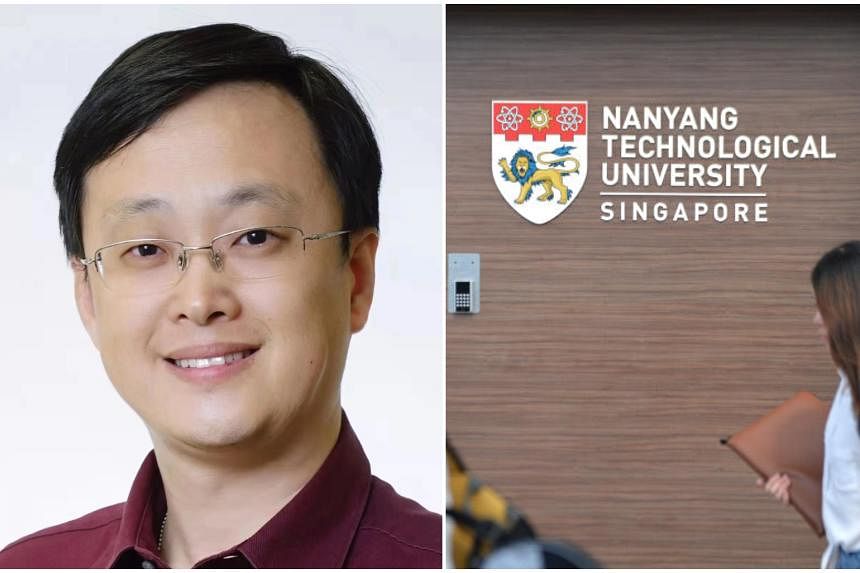
Associate Professor Qu Jingyi was the head of Chinese at the School of Humanities at NTU. PHOTOS: NTU, ST FILE

Chin Hui Shan
Oct 13, 2023
SINGAPORE – The Nanyang Technological University (NTU) academic at the centre of a plagiarism scandal in July is no longer employed by the university.
In response to queries from The Straits Times, an NTU spokesman said: “Associate Professor Qu Jingyi is no longer employed by the university with effect from Oct 11, 2023. As disciplinary proceedings are confidential, we are unable to comment further.
“The university is committed to the highest standards of ethical and professional conduct, and takes all academic misconduct and breach of the university’s code of conduct very seriously.”
The NTU spokesman did not elaborate on whether Prof Qu was dismissed or had resigned.
In July, ST reported that Prof Qu was accused of plagiarising a former student’s final-year project in his 2018 research paper titled Escape As A Mode Of Existence: On Ruan Ji’s Escapism Complex.
He was the head of Chinese at the School of Humanities at NTU and the deputy director of its Centre for Chinese Language and Culture. A check on Thursday showed his profile had been removed from the department’s webpage.
The accusations against Prof Qu were first made on online forum Reddit by someone claiming to be an NTU student. The person had noticed stark similarities between Prof Qu’s 2018 research paper and Mr Wang Yueming’s 2014 project, titled Escapism In The Literary Works Of Ruan Ji.
Prof Qu was Mr Wang’s final-year project supervisor in 2014.
Prof Qu’s paper is written in English, while Mr Wang’s is in Chinese. Prof Qu’s paper, which was accessible on Academia.edu, an open repository of academic articles, has since been taken down.
Checks by The Straits Times in July found that over 50 per cent of Prof Qu’s paper looked like a direct translation of Mr Wang’s paper, with no attribution to the latter. These sections included analyses of poems and inferences made on related research papers.
Prof Qu joined NTU in 2010 and holds a PhD from Peking University and the University of Wisconsin-Madison, according to his profile on the university’s website. He has received scholarships such as the Fulbright Scholarship, Peking University PhD full scholarship and NTU’s Nanyang Education Award. He has produced over 100 published works in English and Chinese, including 49 journal articles.
Associate Professor Yow Cheun Hoe, director of NTU’s Chinese Heritage Centre and the Centre for Chinese Language and Culture, remains the department’s acting head, according to the NTU Chinese department’s webpage. He was appointed in July after ST reported the accusations against Prof Qu.
300 better.simple.....3 strokes of the rotan will do wonders for this huge problem,
but that won't happen until someone rotan joesphine teo's phua cheebye
Which dictatorship cuntry doesn't take bribes?Josephine Teo this chao cheebye must be sleeping and accepting bribes.
Drag her out strip her naked and flog her old pussy!
Which tiong doesn't steal and plagiarize from others ?NTU don accused of plagiarising former student’s work ‘no longer employed by the university’

Associate Professor Qu Jingyi was the head of Chinese at the School of Humanities at NTU. PHOTOS: NTU, ST FILE

Chin Hui Shan
Oct 13, 2023
SINGAPORE – The Nanyang Technological University (NTU) academic at the centre of a plagiarism scandal in July is no longer employed by the university.
In response to queries from The Straits Times, an NTU spokesman said: “Associate Professor Qu Jingyi is no longer employed by the university with effect from Oct 11, 2023. As disciplinary proceedings are confidential, we are unable to comment further.
“The university is committed to the highest standards of ethical and professional conduct, and takes all academic misconduct and breach of the university’s code of conduct very seriously.”
The NTU spokesman did not elaborate on whether Prof Qu was dismissed or had resigned.
In July, ST reported that Prof Qu was accused of plagiarising a former student’s final-year project in his 2018 research paper titled Escape As A Mode Of Existence: On Ruan Ji’s Escapism Complex.
He was the head of Chinese at the School of Humanities at NTU and the deputy director of its Centre for Chinese Language and Culture. A check on Thursday showed his profile had been removed from the department’s webpage.
The accusations against Prof Qu were first made on online forum Reddit by someone claiming to be an NTU student. The person had noticed stark similarities between Prof Qu’s 2018 research paper and Mr Wang Yueming’s 2014 project, titled Escapism In The Literary Works Of Ruan Ji.
Prof Qu was Mr Wang’s final-year project supervisor in 2014.
Prof Qu’s paper is written in English, while Mr Wang’s is in Chinese. Prof Qu’s paper, which was accessible on Academia.edu, an open repository of academic articles, has since been taken down.
Checks by The Straits Times in July found that over 50 per cent of Prof Qu’s paper looked like a direct translation of Mr Wang’s paper, with no attribution to the latter. These sections included analyses of poems and inferences made on related research papers.
Prof Qu joined NTU in 2010 and holds a PhD from Peking University and the University of Wisconsin-Madison, according to his profile on the university’s website. He has received scholarships such as the Fulbright Scholarship, Peking University PhD full scholarship and NTU’s Nanyang Education Award. He has produced over 100 published works in English and Chinese, including 49 journal articles.
Associate Professor Yow Cheun Hoe, director of NTU’s Chinese Heritage Centre and the Centre for Chinese Language and Culture, remains the department’s acting head, according to the NTU Chinese department’s webpage. He was appointed in July after ST reported the accusations against Prof Qu.
不偷窃, 不抄袭就不配做终国人!
NTU dropout used fake degree to get hired at Walt Disney, Marshall Cavendish
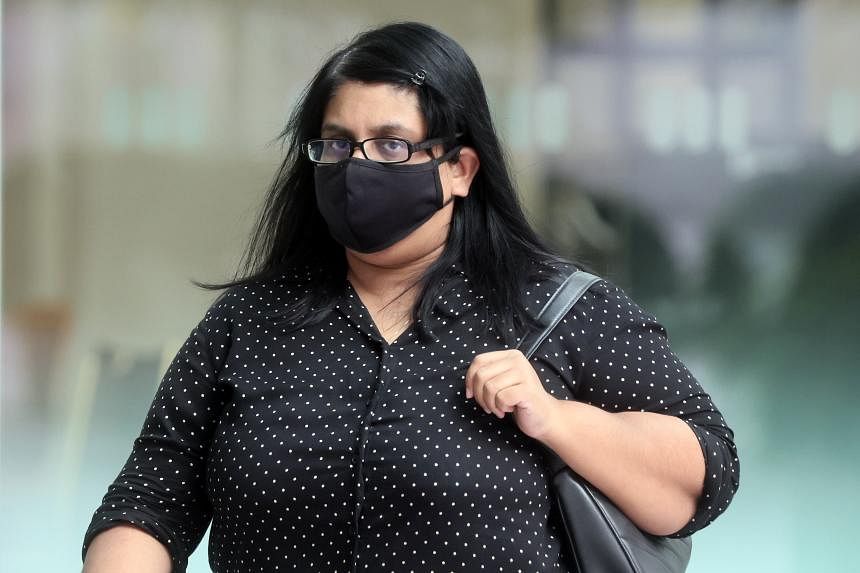
Fonseka Wannerichega Hema Ranjini was convicted of two counts of cheating and a count of committing forgery. ST PHOTO: KELVIN CHNG

Wong Shiying
NOV 24, 2023
SINGAPORE – A Nanyang Technological University (NTU) dropout forged a bachelor’s degree in engineering certificate from the university and cheated at least five companies into hiring her between 2005 and 2021.
On Nov 23, Fonseka Wannerichega Hema Ranjini, 44, was convicted of two counts of cheating and a count of committing forgery. Two similar charges will be taken into consideration for her sentencing.
Using the fake certificate to apply for jobs, Fonseka was hired by companies such as The Walt Disney Company, Marshall Cavendish and Scholastic Education International, earning a monthly salary of between $4,200 and $6,800.
The court heard that Fonseka, whose highest attained educational qualification is GCE A levels, enrolled at NTU to study engineering in 1998, but dropped out in August 2004 as she struggled to pass various modules and pay the tuition fees.
In 2005, Fonseka used a computer programme to design a certificate showing that she graduated from NTU in June 2004 with a bachelor’s degree in engineering with third-class honours.
She told the court on Nov 23 that she made the certificate by adding her name and major to a template she found online. She printed the certificate on cardstock paper and laminated it.
She applied for various jobs using the fake certificate.
In August 2005, Fonseka was hired by publisher Marshall Cavendish as an assistant managing editor with a monthly salary of $4,200.
It is not clear how long she stayed at the company. Court documents stated that she became an acquisition associate at Marshall Cavendish from November 2012 to May 2013, during which she drew the same salary of $4,200 a month.
In July 2015, Fonseka joined publisher Scholastic Education International as an assistant managing editor, earning $4,300 a month. She was promoted to managing editor a year later, and was paid $4,600 a month.
She was laid off from the company in February 2017 due to unsatisfactory work performance, the court heard.
Scholastic paid her a total of $83,800 during the period of her employment.
In 2021, Fonseka applied to entertainment and media enterprise The Walt Disney Company in South-east Asia and was hired as a learning editor in the publishing department from June to December that year.
Her monthly salary there was $6,800 a month and she was given a transport allowance of $1,084 a month, bringing her total remuneration to $7,884 a month.
Her offences came to light when Walt Disney sent her fake certificate to be validated by a third-party vendor shortly after she was hired.
After NTU confirmed that it did not award Fonseka with a degree, Walt Disney’s human resources department asked the accused for an explanation.
She claimed that she withdrew from NTU in her final year of undergraduate studies, but the university issued a certificate at her request to prove she was enrolled there for a period of time.
In October 2021, an NTU employee lodged a police report over the fake certificate. Fonseka resigned from Walt Disney in December 2021. The company paid her about $47,300 during the period of her employment.
According to court documents, she was also hired by publishing firm Cengage Learning Asia, and design and communications firm Oxygen Studio Designs in 2018.
She will be sentenced on Dec 6.
NTU dropout who forged bachelor’s degree certificate, duped firms into hiring her gets jail
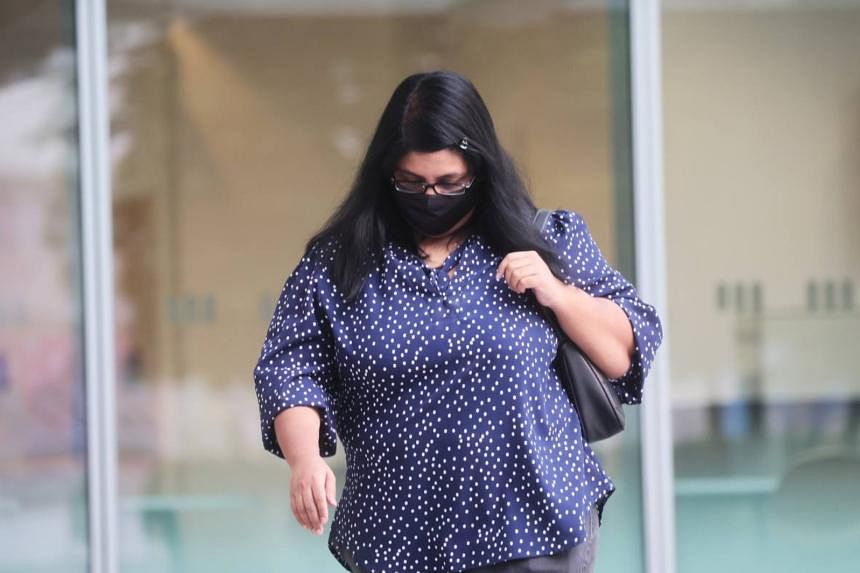
Fonseka Wannerichega Hema Ranjini pleaded guilty to two counts of cheating and a count of committing forgery. ST PHOTO: KELVIN CHNG

Shaffiq Alkhatib
Court Correspondent
Dec 6, 2023
SINGAPORE - A Nanyang Technological University (NTU) dropout, who forged a bachelor’s degree in engineering certificate from the institution and duped multiple firms into hiring her, was jailed for eight months on Dec 6.
By using the fake certificate, Fonseka Wannerichega Hema Ranjini was hired by companies such as The Walt Disney Company, Marshall Cavendish and Scholastic Education International, earning a monthly salary of between $4,200 and $6,800.
On Nov 23, the 44-year-old Singaporean pleaded guilty to two counts of cheating and a count of committing forgery. Two other charges were considered during sentencing.
Before handing down the sentence on Dec 6, District Judge Terence Tay noted that her offences had deprived more deserving people from getting the jobs she clinched.
Fonseka, whose highest attained educational qualification is GCE A-levels, enrolled at NTU to study engineering in 1998, but dropped out in August 2004 as she struggled to pass various modules and pay the tuition fees.
In 2005, she used a computer programme to design a certificate showing that she had graduated from NTU in June 2004 with a bachelor’s degree in engineering with third-class honours.
After that, she used the bogus document and applied for various jobs.
In August 2005, publisher Marshall Cavendish hired her as an assistant managing editor with a monthly salary of $4,200.
In July 2015, Fonseka joined publisher Scholastic Education International as an assistant managing editor, earning $4,300 a month. She was promoted to managing editor a year later, and was paid $4,600 a month.
Scholastic paid her a total of $83,800 during the period of her employment. But in February 2017, she was laid off due to unsatisfactory work performance.
In 2021, Fonseka applied to entertainment and media enterprise The Walt Disney Company in South-east Asia and was hired as a learning editor in its publishing department from June to December that year.
Her monthly salary there was $6,800 a month and she was given a transport allowance of $1,084 a month, bringing her total remuneration to $7,884 a month.
Her offences came to light when Walt Disney sent her fake certificate to be validated by a third-party vendor shortly after she was hired.
Walt Disney’s human resources department asked Fonseka for an explanation after NTU confirmed that it did not award the offender with a degree.
Fonseka then claimed that she withdrew from NTU in her final year of undergraduate studies, but it issued a certificate at her request to prove she was enrolled there for a period of time.
In October 2021, an NTU employee alerted the police; Fonseka resigned from Walt Disney in December 2021. The company paid her about $47,300 during the period of her employment.
On Dec 6, Deputy Public Prosecutor Melissa Heng urged Judge Tay to sentence her to up to 10 months’ jail.
The DPP also stressed that Fonseka had put in considerable effort to make the fake certificate appear genuine, and that she had earned considerable salaries.
Defence lawyer Foo Cheow Ming pleaded for his client to be given either a fine or a “very brief” jail term.
He told the court that Fonseka’s mother had abused her physically and mentally, and that the affected firms did obtain services from his client.
For each count of cheating, an offender be jailed for up to three years and fined.
Myanmar engineersRanking of frauds
1. CECA
2. Tiong
3. VIETCONG
4. PINA
All third world refugees fleeing to the first world. What can they bring apart from problems, crime and diseases?Myanmar engineers
Vizzio CEO’s fabricated credentials, inflated client list haunt start-up
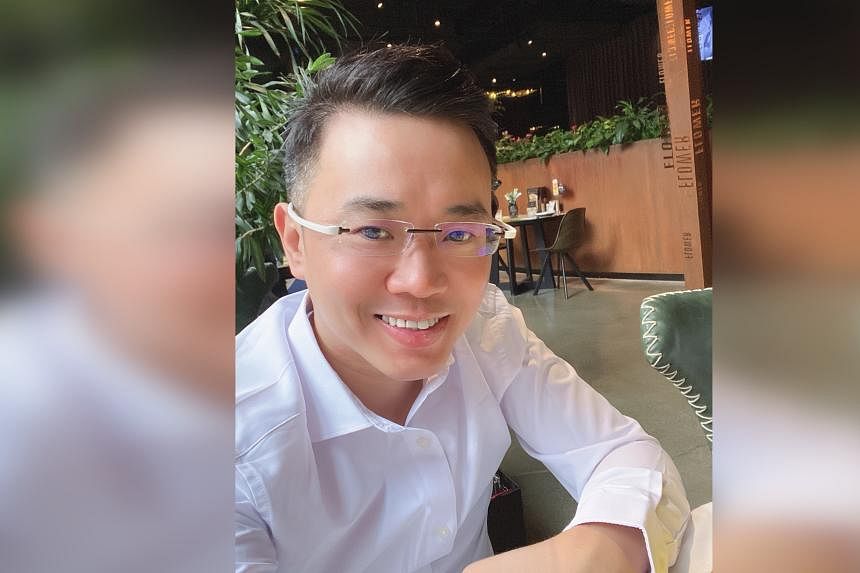
In an expose by online publication Tech in Asia, Vizzio founder and CEO Jon Lee was said to have forged his doctorate certificate from Cambridge. PHOTO: VIZZIO TECHNOLOGIES

Osmond Chia
JAN 22, 2024
SINGAPORE – Up-and-coming artificial intelligence (AI) start-up Vizzio Technologies landed in hot water after its chief executive was found to have faked his credentials.
In a Jan 16 expose by online publication Tech in Asia, Vizzio founder and CEO Jon Lee – previously known as Dennis Lee – was said to have forged his doctorate certificate from Cambridge.
Some partner firms contacted by The Straits Times said that they are reconsidering their ties with Vizzio on the back of the developments. A renowned AI scientist has also stepped down from its board.
Meanwhile, several entities whose logos are listed as clients on Vizzio’s website have clarified that they are not customers of the company – or at least not directly.
Started in 2019, the Singapore-based AI firm uses software to make 3D interactive maps of cities and digital objects. It garnered international media attention, including being listed among The Information’s 50 most promising start-ups.
During an interview with Tech In Asia on Jan 12 following investigations it had conducted, Mr Lee confessed to having lied about having a computer science doctorate from Cambridge and admitted that his doctorate certificate was forged.
Mr Lee on Jan 17 apologised for his “personal misstep” on the firm’s website, and added that the board and shareholders decided that he would continue to serve as CEO.
ST’s checks on Jan 19 found that Vizzio’s website had listed more than 20 Singapore government organisations and major companies as clients.
Temasek Polytechnic (TP), SMRT, the Infocomm Media Development Authority, the Ministry of Home Affairs, and the Hong Kong Police were among the organisations whose logos had been removed since the scandal broke. The client list was whittled down to 17 by 9pm on Jan 22.
The Government Technology Agency (GovTech), whose logo is still on the site, denied being a client.
Its spokesperson told ST: “While Vizzio did a demonstration of its capabilities to GovTech in 2020, GovTech did not proceed to procure any products and is not a current customer of Vizzio.”
When contacted, Mr Lee said that Vizzio had worked with GovTech under a paid proof-of-concept product demonstration. He showed ST a copy of a contract with GovTech dated April 6, 2020, over a video call.
TP should not have been included under Vizzio’s list of clients, said Mr Lee. He said the polytechnic had engaged infrastructure consultancy Surbana Jurong, which worked with Vizzio to develop a digital twin on the polytechnic’s behalf.
A spokesperson for the polytechnic said: “TP is not a direct customer of Vizzio Technologies. It is used by a TP-appointed vendor for support in the vendor’s operational work. TP will look into the matter with its commissioned vendor.”
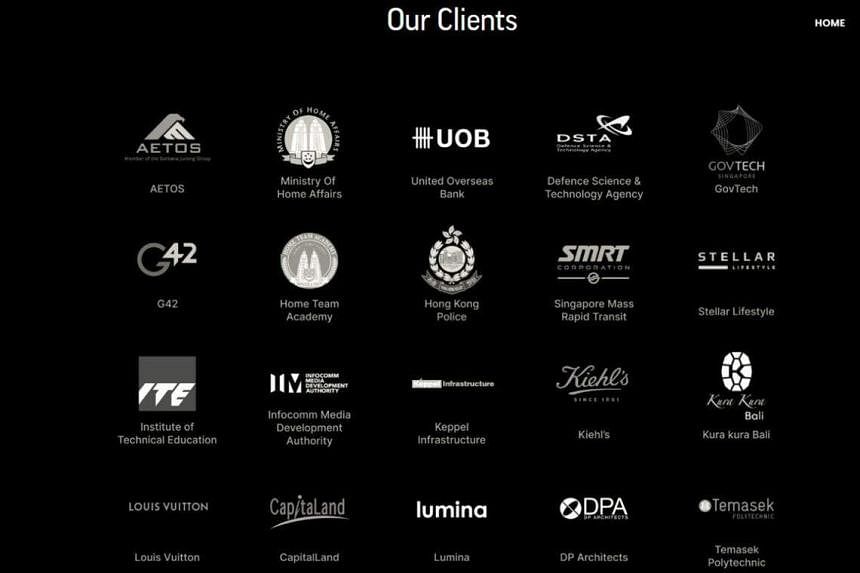
Several entities whose logos are listed as clients on Vizzio’s website on Jan 19 have clarified that they are not customers of the company. PHOTO: VIZZIO
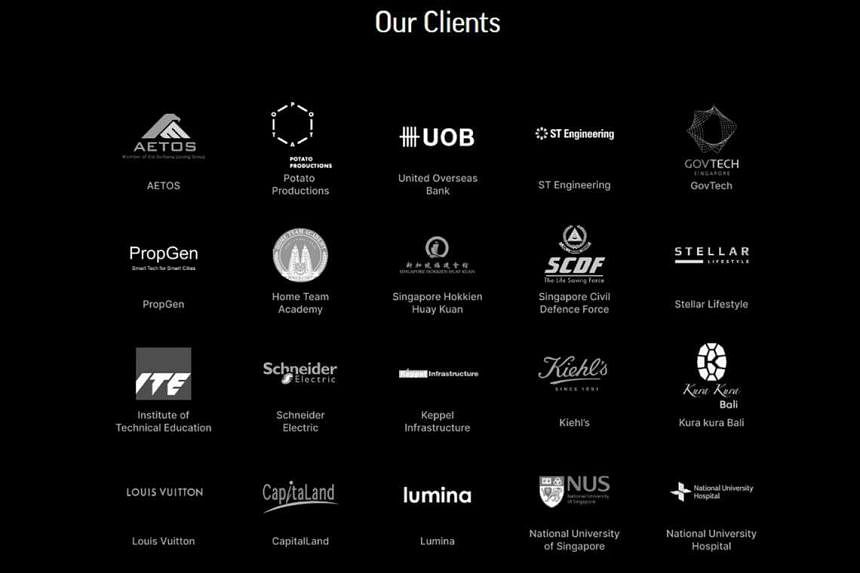
Vizzio.ai's website on Jan 22 which show the company removed the logos of organisations previously listed as clients, including Temasek Polytechnic and SMRT. PHOTO: VIZZIO
Other companies linked to Vizzio are also reassessing their ties with the firm.
These include DP Architects and Surbana Jurong, which collaborated with Vizzio under Aetos, a security firm under its group, to build digital renders of facilities for virtual surveillance.
A spokeswoman for Surbana Jurong said: “In light of the recent disclosures, we are conducting a comprehensive evaluation of our arrangements with Vizzio, while continuing to deliver high-quality solutions to our clients.”
“(We) do not condone the fraudulent misrepresentations by Vizzio’s founder Jon Lee,” she added.
Mr Lee said Vizzio will thoroughly review the content on its website and official marketing pages. “I want to reiterate that I have contacted the majority of customers, partners, board members and investors. I have apologised to them about my judgment lapse, and I will work to rebuild whatever trust has been lost,” he added.
Following Mr Lee’s admission, Vizzio board member Lee Kai-Fu has stepped down.
Dr Lee, a Taiwanese AI scientist and the author of AI 2041: Ten Visions For Our Future, is CEO of Sinovation Ventures, which invested in Vizzio. Singtel Innov8, which invests in start-ups, is another investor.
Mr Lee’s admission adds to a history of fabricated claims. He was in 2001 dropped by software provider Elipva, where he served as its chief technology officer under the name Dennis Lee, after The Business Times revealed that he had falsely claimed to have won awards and fellowships from prestigious universities and foundations.
Elipva’s subsequent probe discovered that he had faked awards in his portfolio, such as a “rare AI award” sponsored by the Association for the Advancement of Artificial Intelligence and Stanford University.
Civil and criminal lawyer Mark Yeo told ST that individuals who forge documents and fabricate their credentials could land themselves in legal trouble if their partners feel that they have been deceived. “Anyone who puts money into the company could take issue with these practices, especially if the credentials formed part of the pitch presented to them,” the director of Fortress Law Corporation added.
Forgery can apply to those who falsify a record with the intent to support any claim or title, to cause a person to enter a contract, according to Section 463 of Singapore’s Penal Code.
Vizzio chairman Abu Bakar Mohd Nor, who is a director of SMRT Corp, on Jan 16 signed off on a statement on the firm’s website that said the board will continue to back Mr Lee as CEO.
Mr Bakar, who also sits on the Board of Trustees of the Singapore Institute of Technology and the Board of Public Utilities Board, wrote: “The board is of the opinion that the technology developed by Vizzio is not dependent on the doctorate. The technology has since proven itself and has been successfully deployed in Singapore and other parts of the world.”
He added: “On the issue of Jon’s time in Elipva until 2001, the board firmly believes that no one should be sanctioned again for what happened 23 years ago when Jon Lee was a 29 year-old technopreneur... We cannot, and will not, take his life’s work away from him as he has paid his dues some 23 years ago as a young man.”
Stellar Lifestyle, which manages retail spaces in SMRT’s rail network, said it stands by Vizzio. Its president, Mr Tony Heng, told ST: “We engaged Vizzio to develop interactive 3D digital map solutions. Vizzio has superior technical solutions that meet our requirements, and we are pleased that they have delivered on their contractual obligations so far.”
In his Jan 17 statement, Mr Lee said: “I had intended to address this matter prior to the report as part of my long-term plan to transition the leadership of our company since the beginning of the Covid-19 pandemic.”
He added: “Misrepresenting my academic qualifications was a grave misjudgment, and I fully acknowledge its seriousness. I want to assure all our stakeholders that this personal misstep does not have a bearing on the integrity or achievements of our company.”
He said Vizzio will implement new measures to preserve the firm’s integrity, without providing further details.
Vizzio fiasco: Who is Jon Lee, founder and former CEO of the AI start-up?

Mr Jon Lee apologised for forging a PhD certificate from the University of Cambridge in the wake of an expose series. PHOTO: JON LEE/LINKEDIN

Osmond Chia
UPDATED
FEB 18, 2024, 05:02 AM
FacebookTelegram
SINGAPORE – Vizzio Technologies founder Jon Lee, who admitted that his PhD is fake, has stepped down as chief executive, the artificial intelligence (AI) start-up confirmed as it fights to reclaim its reputation.
Mr Lee, 53, has a new role overseeing research and development at the Singapore-based company, which creates 3D interactive maps and digital objects.
Mr David See, Vizzio’s chief marketing officer, will take the reins as interim CEO, the firm told The Straits Times on Feb 13. Mr See previously founded an events and public relations company called Lumina Live.
The reshuffle is ongoing after Mr Lee, who goes by Lee Seng Fook in official documents, was found to have faked his credentials, in an expose by tech publication Tech In Asia on Jan 16. ST understands that no police report has been made on the matter, as at Feb 17.
The Cambridge PhD lie went as far as China, where media articles repeated his fraudulent credentials.
Mr Lee told ST that he has apologised to his clients, investors and colleagues and that he stands by his technology.
“I will work to rebuild whatever trust has been lost,” he said. “It’s important to note that Vizzio is built on technology backed by (more than) 25 patents and (intellectual property) applications, delivering real value to paying customers at different stages of delivery.”
Other inconsistencies have been unearthed at Vizzio, including an inflated client list, ST reported on Jan 22.
Some of Vizzio’s partners and investors have exited. Renowned AI researcher Lee Kai-Fu left Vizzio’s board of directors.
Singtel Innov8, the telco’s venture capital arm, has also pulled out its investments in Vizzio, it told ST on Feb 14.
History repeats itself
In the 1990s, Mr Lee co-founded software firm Elipva, where he served as chief technology officer under the name Dennis Lee.In 2001, the company fired him after The Business Times reported that he had allegedly lied about publishing a book titled Dotcomming The Enterprise, and that he was a top AI researcher who had won awards and fellowships from the Massachusetts Institute of Technology and Stanford University.
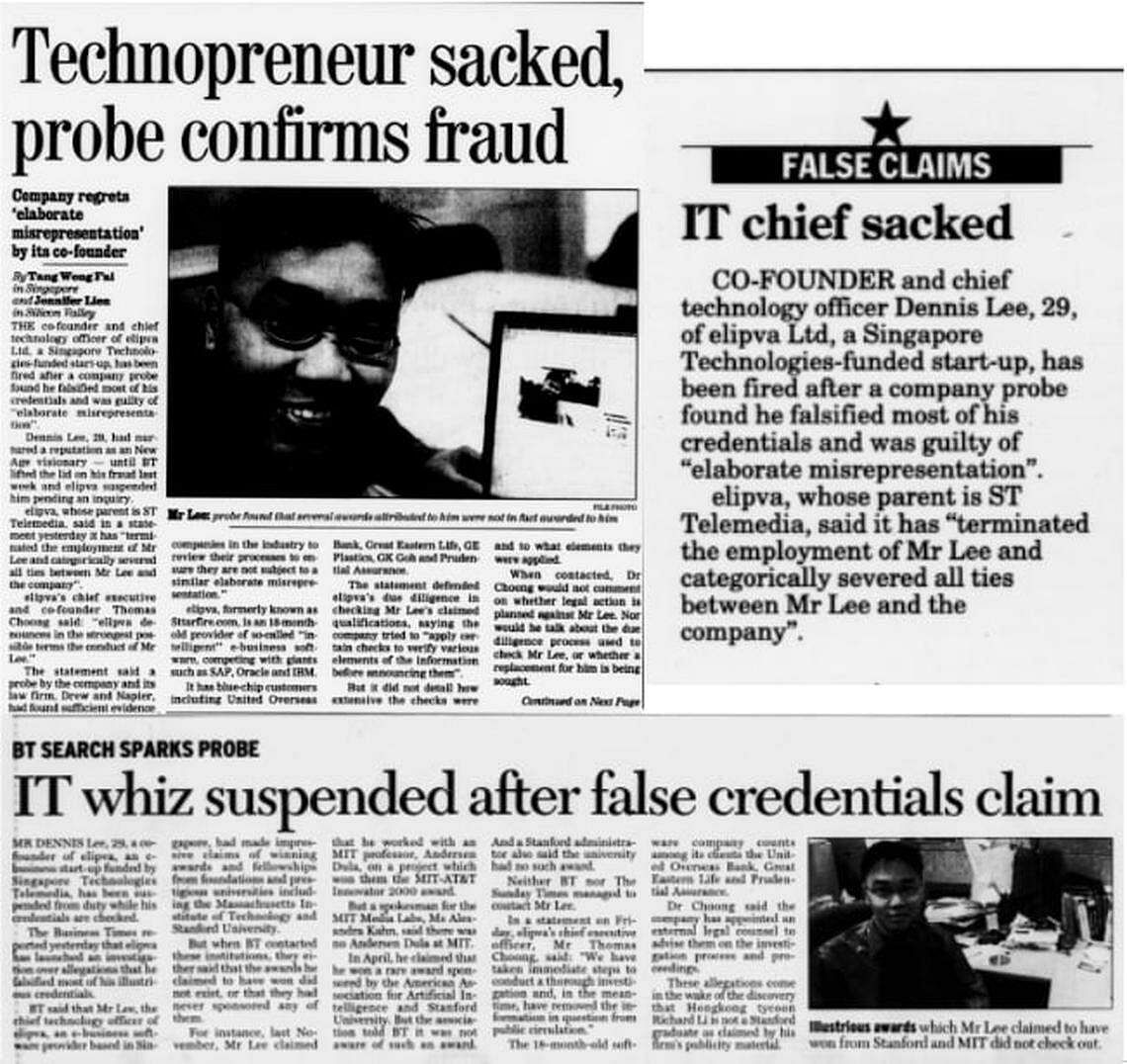
A collage of articles from The Business Times (top left), The Straits Times (bottom) and The New Paper published in 2001 on the probe in to Mr Lee’s fake credentials. PHOTO: SPH ARCHIVES
There were other discrepancies too.
The number of patents Mr Lee said he held changed over time: from “more than 400” (2020 interview with Chinese media); to “512” patents filed and awarded (Vizzio’s 2023 GitBook page); to “612” on LinkedIn, where it was changed to “400+” (citing a correction); to “160” (in an e-mail to ST on Feb 13), which he clarified refers only to those indexed by Google Patents, with 40 granted.
Tech In Asia also accused the company of using plagiarised content in its promotional videos, which Mr Lee said was an error made by a former employee.
Mr Lee said: “With respect to the allegations raised during my employment at Elipva more than 20 years ago, I refer you to the various patent filings and achievements in the past two decades, and leave you to make your own judgment on my technical proficiency.”
Vizzio CEO’s fabricated credentials, inflated client list haunt start-up
NTU dropout used fake degree to get hired at Walt Disney, Marshall Cavendish
Start-up darling
After the Elipva debacle, Mr Lee continued to chase his tech dreams.According to his LinkedIn profile, he set up companies, including a games development firm called Pixel Games in 2009.
He claimed to have sold the company for 120 million yuan (S$22.8 million), but ST could not find any trace of the company or its sale online.
Mr Lee told ST that he could not provide articles or any documents of the sale as it was a private deal, adding: “It is true that I founded Pixel Games China and sold it for 120 million yuan. The other details of the sale are confidential.”
Mr Lee’s LinkedIn profile states that he served as a director of Britain-based Picsel Technologies between 1999 and 2007, overlapping with his stint at Elipva.
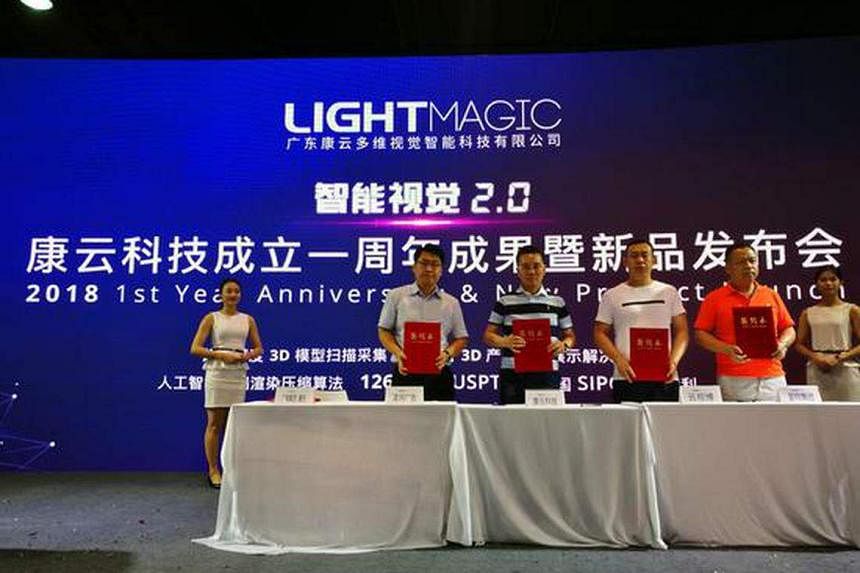
Mr Jon Lee left to do business in China, where he co-founded a company called LightMagic, which specialises in 3D mapping technology. PHOTO: SINA
Some time between 2001 and 2018, he lived in China where he was known as an entrepreneur in the field of 3D design and AI, according to Chinese news reports. He is also supposed to have co-founded a Guangzhou-based firm called LightMagic, which helped lay the foundations for Vizzio.
He said he is no longer a shareholder of LightMagic.
According to archived records of Vizzio’s GitBook page, which has been deleted, LightMagic beat 37,000 companies to win the top prize at China’s Most Prestigious IT Competition 2019, winning 8 million yuan.
Also on Vizzio’s defunct GitBook page: Its tech has raised 39.5 million yuan in contracts in China since 2019.
The company said it uses AI to create realistic images of objects and cities, entirely by machines, “no humans involved”. It claims its technology is 30 times faster than traditional laser scanners and can cover 10,000 sq ft of footage in 45 minutes.
Who is Jon Lee?
To Vizzio investors and potential clients, Mr Lee nurtured an image of himself as a driven and enthusiastic tech whiz.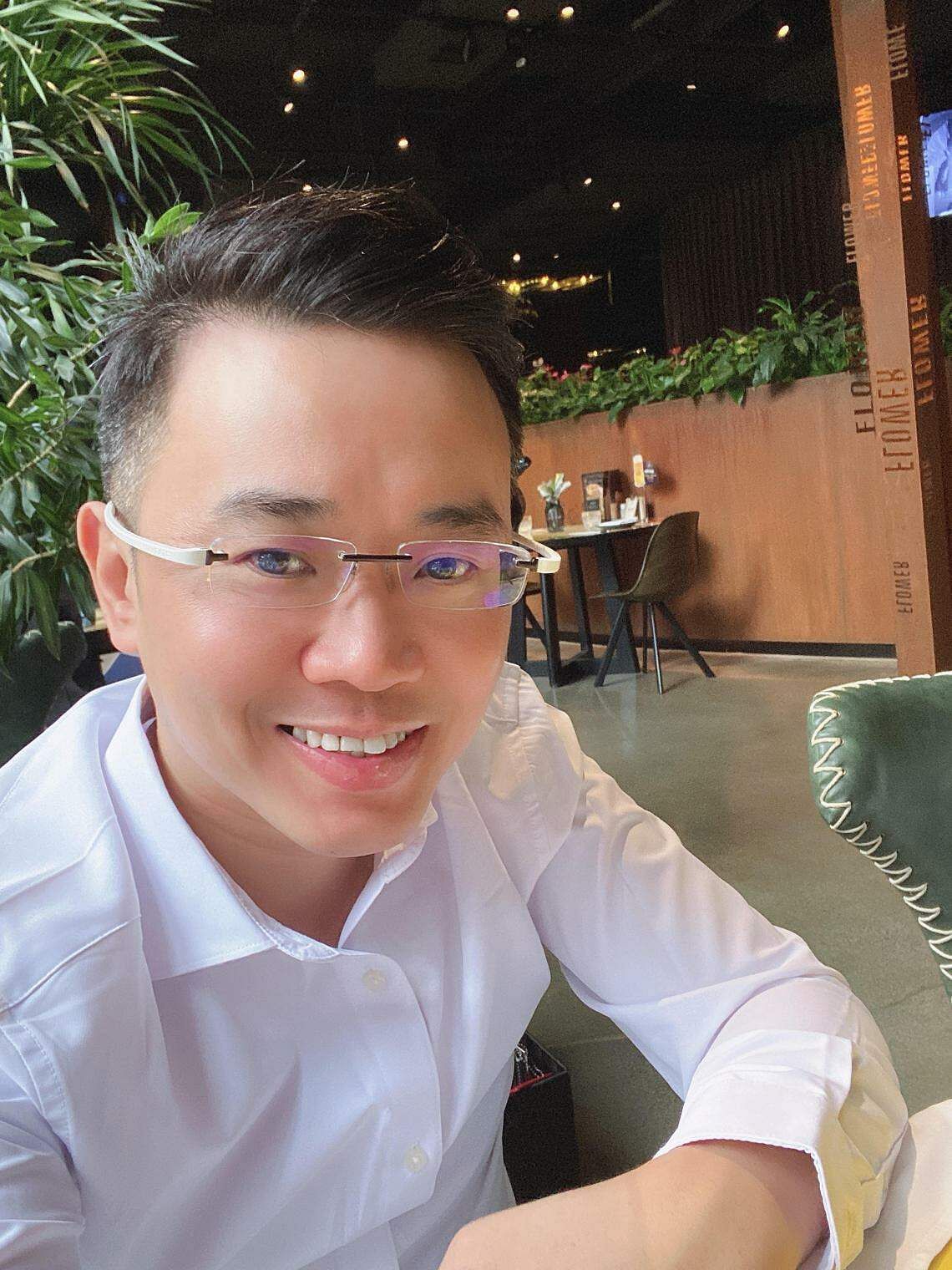
Mr Jon Lee is the founder and former chief executive of AI start-up Vizzio. PHOTO: VIZZIO TECHNOLOGIES
He frequently posted on LinkedIn about Vizzio’s roadshows featuring Singapore politicians and executives, as well as stories about business trips abroad, motivational quotes and books he read.
His posts included content about projects with transport companies SMRT and SBS Transit and security firm Aetos, and mentioned the organisations’ representatives.
Mr M (not his real name), a former manager at Vizzio who declined to give his name due to a non-disclosure agreement, described Mr Lee as a “persistent” businessman.
“He follows potential investors very closely,” said Mr M, who accompanied Mr Lee on work trips. “He will flood them with videos and impressive info (such as) his clients and all the potential projects on the list.”
“Investors were all over him,” said Mr M, who left Vizzio in 2023 after more than a year there.
But Mr M and three other former Vizzio employees ST spoke to said staff morale at Vizzio was poor – some quit as they were kept in the dark about the product they were meant to sell, while others grew frustrated over the long hours they had to put in and the pressure to sell.

Vizzio said it uses AI technology to convert 2D satellite images into high-fidelity, photorealistic 3D models, including that of objects and cities. PHOTO: LIANHE ZAOBAO
Former Vizzio business development manager Ng Yik Fei said Mr Lee would constantly remind sales staff about lucrative deals he had struck with global clients.
Yet, Mr Ng added, he was handed only sales presentation decks of Vizzio’s 3D renders and never the real demos of the working product.
He resigned from Vizzio in early 2023 after several months at the firm.
Mr M said that even at his level, he did not know how the AI tools to map cities truly worked.
Vizzio’s chief operating officer John Hui did not give details about how the company’s AI worked when asked, but said it was “undeniable” and that it aims to ease the load on humans.
He added: “Vizzio’s technology may appear as a black box because we have been careful in the sharing of aspects of it to non R&D-related executives. This is to protect the confidentiality of our technology.”
Vizzio shake-up
As scrutiny of Vizzio intensified, some investors and partners who were drawn to the promise of quick and comprehensive 3D mapping have grown cautious.Surbana Jurong, whose security firm Aetos collaborated with Vizzio on a 3D mapping system for virtual patrols, has suspended all new projects with Vizzio while it reconsiders their relationship, said a spokesperson for the group.
DP Architects told ST on Feb 8 that it had ended ties with Vizzio.
Its director Chan Hui Min also stepped down from the board of directors of a Vizzio subsidiary called 3Dimension.AI, where Mr Lee also served as director.
Some people have continued to stand by Vizzio. Mr Tony Heng, president of SMRT’s retail arm Stellar Lifestyle, said on Jan 22 that Vizzio had delivered on its contractual obligations. SMRT has remained silent since.
Vizzio chairman Abu Bakar Mohd Nor, who is also a director of SMRT Corp, had on Jan 16 signed off on a letter that signalled his support for Mr Lee as reports of his fraudulent credentials surfaced.
The letter said Vizzio’s technology is not dependent on Mr Lee’s doctorate and that it had proven itself.
It said: “On the issue of Jon’s time in Elipva until 2001, the board firmly believes that no one should be sanctioned again for what happened 23 years ago when Jon Lee was a 29-year-old technopreneur.”
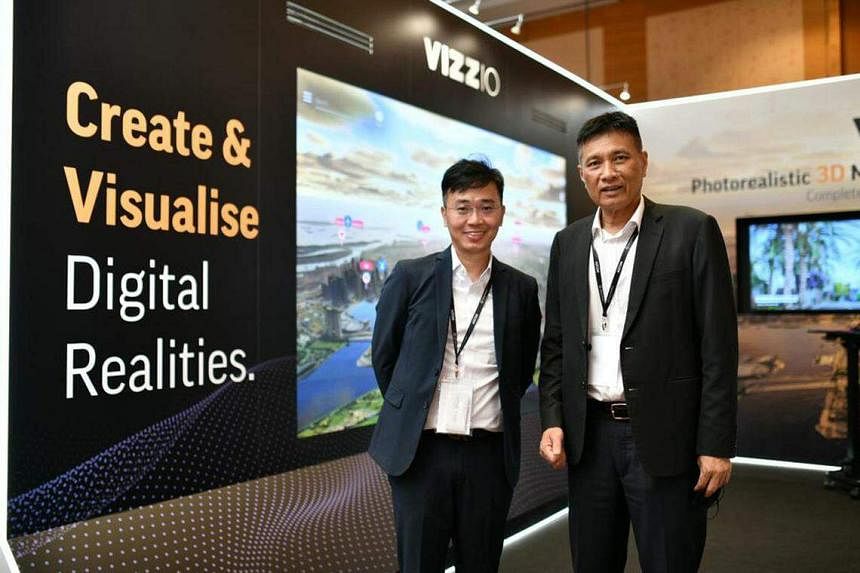
Mr Jon Lee with Vizzio chairman Abu Bakar Mohd Nor, who is also a director of SMRT Corp. PHOTO: ABU BAKAR
Mr Bakar did not respond to queries from ST. He remains as the company’s chairman to work with stakeholders and partners, shareholders, customers and employees, said Vizzio on Feb 13.
Mr Lee now leads an R&D team supported by two senior managers and 13 engineers, said Mr Hui.
On the secrecy surrounding Vizzio’s tech, Mr Kenneth Pimentel, a consultant who met Mr Lee at a technical evaluation, said it is normal practice as tech founders are often worried about getting their ideas stolen.
He added that he has urged Mr Lee to get third-party validation for Vizzio’s tech.
Stories of Dennis Lee are a common topic when former Elipva colleagues meet up each year, said Mr Yao Jun, who was a manager at Elipva between 2000 and 2001.
“Back then, we laughed it off. I thought this guy would have changed,” said Mr Yao. “But he did the same thing again. It just shows the industry doesn’t learn anything.”
Fuck this asshole for setting a bad example. Maybe only got psle pass from cambridge primary school.
Similar threads
- Replies
- 19
- Views
- 1K
- Replies
- 7
- Views
- 933
- Replies
- 38
- Views
- 3K
- Replies
- 3
- Views
- 559
- Replies
- 3
- Views
- 710

